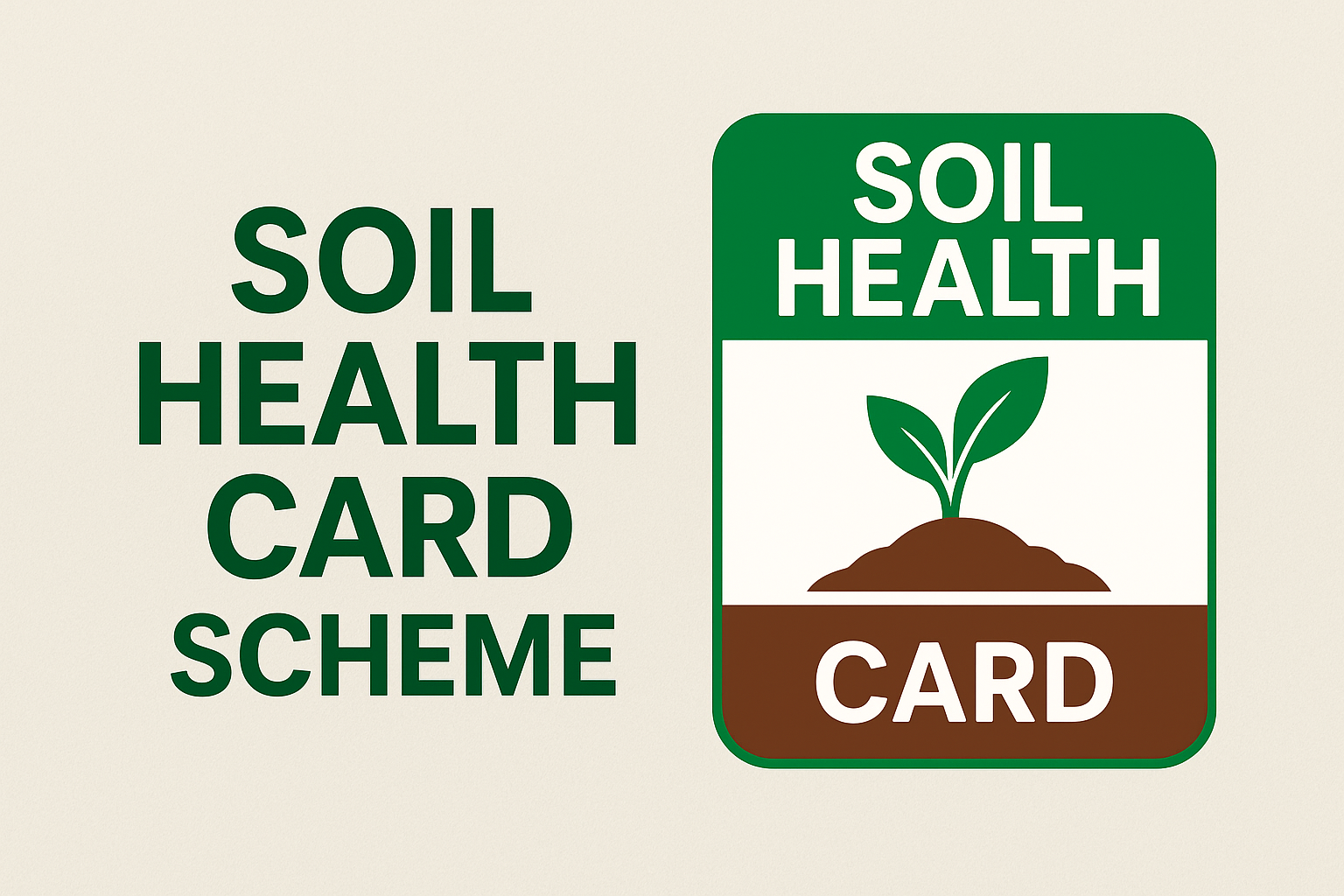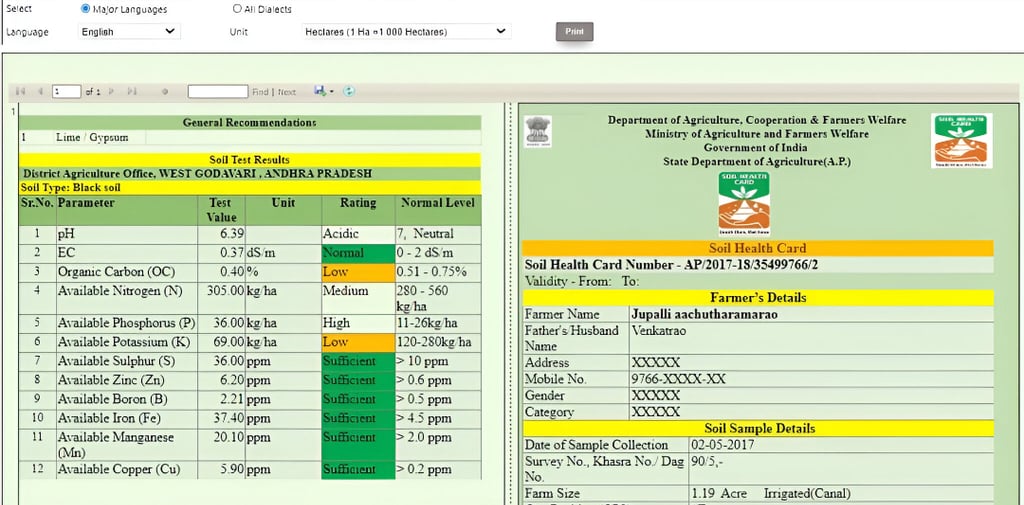Soil Health Card Scheme: A Government Initiative for Sustainable Agriculture in India
Launched in 2015 by the Government of India, the Soil Health Card Scheme aims to promote sustainable agricultural practices through a systematic assessment and management of soil health. Recognizing that healthy soil is foundational to agricultural productivity and environmental sustainability.
SOIL HEALTH & FERTILITY
8/24/20258 min read


Introduction to the Soil Health Card Scheme
Launched in 2015 by the Government of India, the Soil Health Card Scheme aims to promote sustainable agricultural practices through a systematic assessment and management of soil health. Recognizing that healthy soil is foundational to agricultural productivity and environmental sustainability, this initiative provides farmers with the resources and information necessary to enhance their soil's health. Through regular soil testing and expert recommendations, the scheme offers a tailored approach to addressing the specific nutrient requirements of different soil types across various regions.
The Soil Health Card contains details regarding the nutrient status of the soil, along with advice on appropriate fertilization techniques. This information is vital for farmers, as it empowers them to make informed decisions concerning crop selection and soil management practices. The relevance of soil health cannot be overstated; it directly influences crop yield, the nutritional quality of food produced, and the sustainability of agricultural systems. Degraded or imbalanced soils can lead to decreased productivity and increased vulnerability to pests and diseases, which is a significant concern in modern agriculture.
The initiative also underscores the importance of promoting environmentally friendly practices that conserve soil and water resources. By advocating for the judicious use of fertilizers and other chemicals, the Soil Health Card Scheme incentivizes farmers to move away from dependence on chemical inputs, thereby fostering more resilient agricultural ecosystems. Furthermore, the initiative aligns with global sustainability goals, recognizing that healthy soils contribute to climate change mitigation, biodiversity conservation, and the overall well-being of human communities.
Overall, the Soil Health Card Scheme represents a crucial step towards sustainable agriculture in India, equipping farmers with the knowledge and tools necessary to improve their practices and ultimately ensure food security for future generations.
Objectives and Benefits of the Soil Health Card Scheme
The Soil Health Card Scheme, initiated by the Government of India, aims to enhance agricultural productivity and sustainability through detailed analysis of soil health. One of the primary objectives of this initiative is to improve soil fertility across various regions, thereby ensuring that farmers can cultivate crops that thrive in their local environments. By providing farmers with specific information about their soil properties, the scheme encourages the adoption of practices that lead to healthier and more fertile land.
Another significant objective of the Soil Health Card Scheme is to increase crop yields. By making informed decisions based on soil analysis, farmers can optimize the use of fertilizers and other soil amendments. Tailored recommendations provided in the soil health cards help in the precise application of nutrients, which not only boosts production but also reduces the excessive and unnecessary use of chemical inputs. This careful management contributes to environmental sustainability by promoting balanced nutrient application methods.
Furthermore, the Soil Health Card Scheme is designed to enhance the income levels of farmers. When farmers are equipped with personalized soil health cards, they can make more cost-effective decisions regarding their farming inputs. The reduction in input costs, paired with increased crop yields, directly impacts farmers’ profitability. This, in turn, contributes to improved livelihoods and economic stability for agricultural households.
Overall, the Soil Health Card Scheme serves as a crucial tool for promoting sustainable farming practices. By improving soil fertility and crop yield while also focusing on the farmers' economic well-being, the scheme creates a framework for sustainable agricultural development in India. Ultimately, the benefits of personalized soil health cards extend beyond individual farmers to the broader goal of achieving food security and environmental health within the agricultural sector.
How the Soil Health Card Works
The Soil Health Card Scheme represents a significant initiative aimed at promoting sustainable agriculture across India. The process of obtaining a Soil Health Card involves multiple stages, starting with soil sample collection. Farmers are encouraged to collect soil samples from their fields, ideally during the pre-monsoon period. It is crucial that samples represent different areas of the farm to ensure comprehensive analysis. Each sample must be collected and labeled properly, adhering to the guidelines provided by the respective agricultural extension services.
Once the soil samples are collected, they are sent to designated laboratories for thorough testing. These laboratories are equipped to test a variety of soil parameters, which typically includes pH level, electrical conductivity, organic carbon content, and essential nutrients such as Nitrogen, Phosphorus, and Potassium and micronutrients (Cu,Fe,Zn,Mn) etc. The assessment of these parameters forms the basis of a complete soil health analysis, allowing for a clearer understanding of the soil's current state and its suitability for different crops.
After laboratory testing, a detailed report is generated. This report not only outlines the findings from the soil tests but also provides recommendations tailored to improve soil health. Experts analyze the results to suggest specific fertilizers and amendments based on the nutrient deficiencies identified. This process ensures that recommendations are scientifically grounded and aligned with sustainable practices that enhance soil fertility and crop productivity.
Farmers can interpret their Soil Health Cards by examining the key recommendations along with the background of the test results. The cards use a straightforward format, making the information accessible even to those with limited agricultural knowledge. Following the guidelines presented on the Soil Health Card empowers farmers to implement best practices in nutrient management, ultimately leading to healthier soils, increased crop yields, and sustainable agricultural practices.
The Role of Technology in the Soil Health Card Scheme
The Soil Health Card Scheme, launched by the Government of India, aims to promote sustainable agricultural practices by providing farmers with detailed information about the nutritional quality of their soil. Central to the success of this initiative is the incorporation of modern technology, which significantly enhances the efficacy and reach of soil health management. Digital platforms play a crucial role in soil testing, allowing for more accurate and timely assessments of soil health, which is essential for optimal crop production.
Through the utilization of sophisticated soil testing technology, farmers can obtain accurate readings about essential nutrients and soil health indicators. The results are collected and processed through mobile applications and online portals that not only simplify access to this critical information but also ensure that farmers receive tailored guidance based on their specific soil conditions. Such digital integration not only streamlines the analysis process but also ensures that farmers receive timely updates, which can have a lasting impact on their agricultural practices.
Moreover, mobile applications have emerged as vital tools in the Soil Health Card Scheme, enabling farmers to access soil health information from the convenience of their smartphones. These applications often provide features such as crop advisories based on soil test results, thus empowering farmers with the information they need to make informed decisions and optimize yield. Additionally, they serve as platforms for sharing best practices and resources, fostering a community of informed farmers who can support each other in sustainable agricultural practices.
The significance of these technological advancements is underscored by their contribution to data management as well. By centralizing soil health data, policymakers and agricultural experts can analyze trends and develop strategies that effectively address soil health challenges across various regions. In conclusion, the integration of technology in the Soil Health Card Scheme not only enhances accessibility and efficiency but also fosters a more informed farming community, ultimately leading to sustainable agricultural development in India.
Success Stories and Case Studies
The Soil Health Card Scheme, introduced by the Government of India, has garnered remarkable success in enhancing agricultural practices and boosting farmer livelihoods across the country. Numerous case studies highlight how farmers have effectively utilized this initiative to improve their soil health and crop productivity. One such success story is from a farmer in Punjab, who received his Soil Health Card and learned about the specific nutrient deficiencies present in his land. Implementing the recommended soil amendments led to a 40% increase in the yield of his wheat crop. This increase not only improved his family's financial situation but also encouraged him to adopt sustainable farming practices.
Another inspiring example comes from a village in Maharashtra, where a group of farmers collectively participated in workshops organized by agricultural specialists. They reviewed their Soil Health Cards and identified common soil issues. By sharing resources and knowledge, they managed to amend their soil together, leading to a cumulative increase of 35% in their yields during the monsoon season. The initiative cultivated a sense of community and fostered cooperation among the farmers, ultimately enhancing their collective income and sustainability.
Additionally, in Uttar Pradesh, a farmer significantly improved his income by diversifying his crops based on the recommendations of his Soil Health Card. Instead of solely relying on traditional crops, he experimented with organic farming and rotation techniques, which not only enhanced soil fertility but also attracted premium prices in local markets. This shift has encouraged neighboring farmers to follow suit, creating a more sustainable agricultural landscape in the region. These examples serve as powerful testimonials to the efficacy of the Soil Health Card Scheme, showcasing its role in facilitating sustainable agricultural practices and empowering farmers towards prosperity.
Challenges and Limitations of the Soil Health Card Scheme
The Soil Health Card Scheme, while a progressive initiative aimed at improving soil health and boosting agricultural productivity in India, faces several challenges and limitations that hinder its effectiveness. One of the prominent issues is the lack of awareness among farmers. Many farmers, particularly those in rural areas, are not fully informed about the benefits of the scheme or how to interpret their soil health cards. This limited understanding impedes their ability to make informed decisions about soil management and crop cultivation.
Access to technology is another significant challenge. The successful implementation of the Soil Health Card Scheme relies on modern soil testing methods and technology. However, many regions in India, especially remote agricultural areas, lack the necessary infrastructure and resources to conduct accurate soil analyses. This limitation results in suboptimal recommendations, as farmers may base their agricultural practices on incomplete or inaccurate soil health data.
Furthermore, the accuracy of soil testing can be compromised by various factors, including soil sample collection methods and seasonal variations. If soil tests are not conducted meticulously, the soil health cards may present misleading information. This issue not only demotivates farmers but may also lead to inappropriate usage of fertilizers and organic amendments, further degrading soil health.
Moreover, the scheme requires comprehensive extension services to cater to the needs of farmers. Adequate training and ongoing support from agricultural experts are crucial for farmers to understand the implications of their soil health cards. However, the absence of effective extension mechanisms limits the scheme's reach and diminishes its overall impact on promoting sustainable agricultural practices.
Addressing these challenges is essential for enhancing the Soil Health Card Scheme's effectiveness. Increasing awareness through targeted campaigns, improving access to reliable soil testing technology, ensuring the accuracy of results, and providing robust extension services are critical components for the successful implementation of this initiative. Through concerted efforts, the potential of the Soil Health Card Scheme can be fully realized, leading to better sustainable agricultural outcomes in India.
Future Outlook for Soil Health Management in India
The trajectory of soil health management in India is increasingly pivotal, as the country aims to secure sustainable agricultural practices while addressing growing food demands. The soil health card scheme has laid a commendable foundation, yet future advancements will depend heavily on the continued evolution of policies aimed at enhancing soil fertility and productivity. To this end, the Indian government is expected to refine existing agricultural policies, emphasizing soil health monitoring and the implementation of more user-friendly practices that cater to local needs. This could potentially involve integrating technology such as mobile applications for farmers, allowing them timely insights about soil conditions and appropriate interventions.
Moreover, the role of Non-Governmental Organizations (NGOs) will prove instrumental in promoting soil health awareness and education. By collaborating with local communities, NGOs can facilitate workshops and outreach programs to disseminate best practices in soil management. These initiatives can encompass organic farming techniques, sustainable land use practices, and the importance of maintaining soil biodiversity. Improved collaboration between government entities and NGOs can create comprehensive programs designed to make soil health a priority in agricultural discourse.
Research will remain a pillar of progress in soil health management. Continued investment in studies that focus on organic amendments, crop rotation, and agroforestry can yield valuable insights into innovations that enhance soil quality. Additionally, developing effective nutrient management strategies to minimize chemical fertilizer dependency can foster healthier soils, ultimately contributing to more resilient farming systems. By embracing a multifaceted approach that combines research, innovative practices, and community engagement, India can navigate the complexities of modern agriculture while ensuring that soil health management remains at the forefront of its sustainable agricultural future.


"Boosting Crop Growth With Nature's Power"
Contact Us:
E Mail: support@frosil.com
Customer Care: +91 8329592991
FROSIL © 2025. All rights reserved.


'Frosil' is a fertilizer manufacturer committed to enhancing soil health and crop yields. We provide high-quality, eco-friendly products that support sustainable agriculture and help farmers achieve optimal results.
Registered Office: Gat No.96, Near Krushnai Hospital, Tandali. Tal- Shirur, Dist- Pune.
